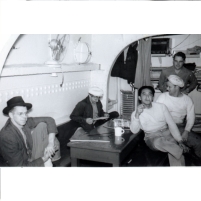Oil Tanker Sunk by Japanese after Pearl Harbor Still an Environmental Threat to California
Saturday, October 15, 2011
 Crew of the SS Montebello, 1941 (photo: California Department of Fish and Game)
Crew of the SS Montebello, 1941 (photo: California Department of Fish and Game)
About two weeks after the attack on Pearl Harbor on December 7, 1941, an American oil tanker set out from Port San Luis, California, bound for a refinery in Canada with fresh crude. The SS Montebello got as far as the central coast of California when a Japanese submarine torpedoed it, sending the ship and its three million gallons of oil to the bottom of the ocean.
Today, divers are examining the wreckage to determine if the trapped oil is of any danger to the state’s pristine coastline near Cambria.
“If 3 million gallons of oil made its way to the beaches in front of Hearst Castle it would be a disaster for the area,” Andrew Hughan, a spokesman with California’s Department of Fish and Game, told the Associated Press.
U.S. Coast Guard spokesman Adam Eggers said there is uncertainty over what would happen if the cargo began to leak from the vessel, which sits about 900 feet below the surface. “It’s 40 degrees down there. Is it going to rise to the surface, warm up and liquefy or it is going to be a rock?”
The Montebello’s sinking was kept a secret by the U.S. government for fear that news of Japanese subs operating off California’s coast would cause a panic. Details of the attack were not publicly disclosed until many years after the war.
-Noel Brinkerhoff
Mission Launched to See If Oil Remains on Old Ship (by Noaki Schwartz, Associated Press)
SS Montebello (by Stephen L. Sawyer, Department of Fish and Game Office of Spill Prevention and Response) (pdf)
- Top Stories
- Unusual News
- Where is the Money Going?
- Controversies
- U.S. and the World
- Appointments and Resignations
- Latest News
- Trump to Stop Deportations If…
- Trump Denounces World Series
- What If China Invaded the United States?
- Donald Trump Has a Mental Health Problem and It Has a Name
- Trump Goes on Renaming Frenzy






Comments